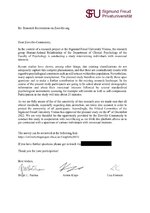The University of Sigmund Freud University Vienna is conducting an anonymous zoophilia study using an online survey that will take no more than 30 minutes to complete.
Here is the link: Study is completed
Research staff:
Birgit U. Stetina
Armin Klaps
Lisa Emmett - Lead Researcher
Zooville.org has been in conversation and has verified that the study is legitimate with a proper letter of intent of using this forum as a survey base. If possible, we highly suggest that you conduct the survey as truthfully as possible and within your margins of personal anonymity. Scientific research into our sexual orientation is always welcomed, and I am glad to have aided them in opening up Zooville to them.
The Letter of Intent is posted below.

Best Regards,
ZTHorse
Here is the link: Study is completed
Research staff:
Birgit U. Stetina
Armin Klaps
Lisa Emmett - Lead Researcher
Zooville.org has been in conversation and has verified that the study is legitimate with a proper letter of intent of using this forum as a survey base. If possible, we highly suggest that you conduct the survey as truthfully as possible and within your margins of personal anonymity. Scientific research into our sexual orientation is always welcomed, and I am glad to have aided them in opening up Zooville to them.
The Letter of Intent is posted below.

Best Regards,
ZTHorse
Last edited:

